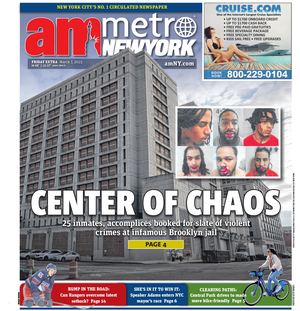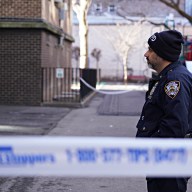Rent rates have spiked across so much of Bedford-Stuyvesant that even non-attorneys are finding a way to profit off evictions.
Richard Cabello, who spent 26 years working in real estate, claims to have launched the first business dedicated solely to helping landlords navigate and expedite the eviction process. His firm Quick Evic’s revenue has exploded since Cabello launched it out of a suitcase in 2015.
“I’m the only one, besides lawyers, engaging in this kind of business,” Cabello said, noting that he has noticed other services crop up that help with one aspect of the eviction process, but none that also cover the entire proceeding.
Quick Evic brought in $20,000 in 2015, which skyrocketed to $180,000 last year, according to Cabello. By the end of 2017, Cabello expects to bring in more than $200,000.
Although the number of evictions in Bed-Stuy has held relatively steady in recent years, more evictions are turning into protracted court battles. Cabello saw this trend as an opportunity to launch Quick Evic. The company works with five lawyers to offer landlords a quicker, more economical path to eviction, according to Cabello.
He estimated law firms typically need six months to a year to empty an apartment, whereas Quick Evic, on average, does so in two to four months.
Attorneys usually charge between $1,200 and $1,400 per eviction proceeding, according to Cabello. But Quick Evic bills clients $300 for each of four stages in the eviction process — beginning with serving a tenant with a notice to vacate, pay or cure issues and concluding with receiving a judge’s decision. The majority of Quick Evic clients resolve their cases within the first two stages, Cabello said.
Naturally, Cabello’s business has caused controversy, particularly in Bed-Stuy, where Quick Evic has 40 pending eviction cases. Cabello estimated one-tenth of households in the neighborhood are battling for their home in court.
As a crush of new residents have moved into the area, market rents have jumped 77 percent between 2005 and 2015, according to a recent report from the state comptroller’s office.
The pricier housing market has led to the displacement of longtime Bedford-Stuyvesant residents, and inspired landlords to look for ways to replace tenants with those who can afford higher rents. For instance, one Quick Evic client worked with Cabello in 2015 to oust three families who made on-time payments of $1,600, $1,700 and $1,800 a month to rent apartments in a three-family home without a formal lease. The landlord was then able to charge $1,000 more a month for each apartment.
Jack Underwood, an attorney with Brooklyn Legal Corporation A who represents Churches United for Fair Housing clients, said Quick Evic’s advertised rates would not be financially viable unless they assume tenants do not have attorneys.
Other critics, including City Comptroller Scott Stringer, have called this approach predatory and protested outside Quick Evic’s office.
“It’s unconscionable,” Stringer said in a statement. “Normalizing, professionalizing, and streamlining eviction during a housing crisis is the underbelly of capitalism.”
Cabello said landlords can be victimized by irresponsible tenants.
A landlord filed into Cabello’s office every 20 minutes with a question or complaint on a recent afternoon. Shawn Hayes, a plumber in Bed-Stuy, griped about a woman renting a room from him, who had failed to pay rent for six months.
“I was just trying to help, and now I’m getting screwed,” Hayes said. “She broke a faucet last night. She physically broke it from the stem.”
Cabello also claimed he is not responsible for market trends.
“Brooklyn residents are a victim of circumstance. Most people can’t afford to live here anymore,” Cabello said. “This has nothing to do with me. This was created by itself.”


































